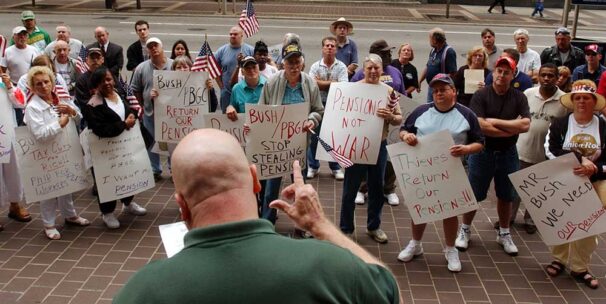
Republic Technologies, Lorain, Ohio, June 14, 2002 —
— Kent State University, Kent, Ohio, May 4, 1970 —
For Bruce Bostick
when the owners of the steel mill
washed their hands
of paying the workers’
pension plan
because the corporation filed
for bankruptcy in 2002
and the courts deemed
that contract null and void
a steelworker dropped dead
from the meaning of the betrayal
and the gunshot
from his own hunting rifle
all his life the worker had worked
on the line
based on that
pension
the hope and dreams
of retiring after everything
all those years of working
in the mill
when the Pension Benefit Guarantee Corporation
decreed OK
for the owners to bolt
because of the bankruptcy
paving the way
for every owner
in auto, airline,
trucking, and steel to do the same
it could have been
a gunshot to the heart
of the workers movement

the workers protested
at the capital
their lawyers appealed
to the Bush-appointed court the outrage
cutbacks, layoffs,
health care, pensions
a contract is a contract
if we workers refused
to honor a contract
we would be put in jail
but the courts which had once
upheld the pension system
upheld the ripping
of the very same contract
the big business newspapers
which had condoned organized labor
now upheld a company’s
sacred bottom line
I think the word had gone out
now the Cold War was over,
no longer necessary to broadcast
capitalism as superior to socialism
any agreement with the AFL-CIO
was an obstacle
to the new world order
multinational corporations sought to build
a new world order
of cheapening labor,
new technology,
and more profits
walls between nations
must fall
for capitalists,
not for workers
pensions for steel workers
should go the way with
unions and Social Security
and the eight-hour day
only the newspaper
of the steelworkers’ union
noted the strange irony
of history
how this worker,
killed by Republic Technologies,
had family ties to another event
in Ohio state history
this one from days
of protests
against the Vietnam War
how that steelworker’s brother
protesting next to a young woman
had become something
of a legend in the area
because of a famous photograph
as she kneeled
next to his stricken body
on a college lawn
her hands
over her mouth
a look of horror
as if forever on her face
as if she saw
on the horizon
a long train
coming
as if she saw
a war, though still
far off, beginning
to shamble home
yes, brothers and sisters,
you know
the photograph
I mean now
bombers flying high
over Vietnam fields and jungles,
troops facing protesting students
in the heartland of America
the chants against the war,
fists lifted in the air,
the connections between things,
the gunshots
the bodies falling to the ground
the line of protesters gasping back,
the American dream, the American scream,
the silence
yes, brothers and sisters,
you know
the photograph
I mean now
that other Ohio time,
that other Ohio place
the protester
fallen to the ground
was the dead steelworker’s
brother
and the woman screaming
next to his crumpled body
was because he had been slain
by the Guard at Kent State
(Previously published in Blue Collar Review.)










